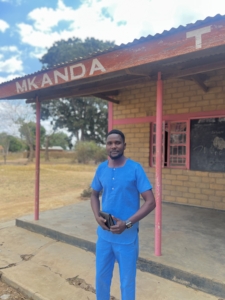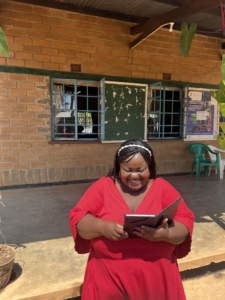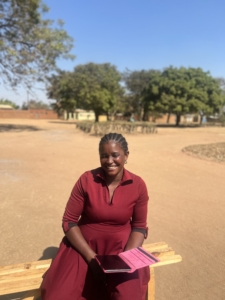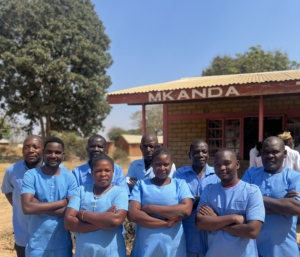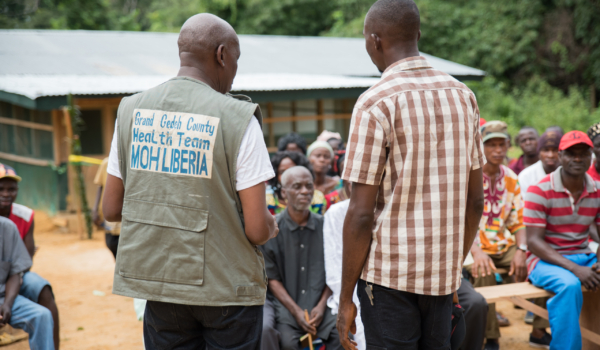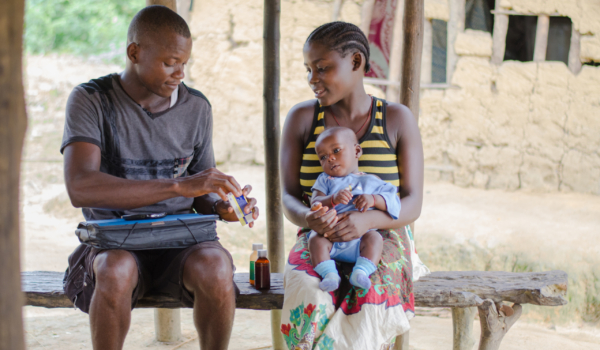Laurent Chinthonga has held a passion for community health for as long as he can remember. “I grew up in a community very similar to the one I am working in now, with a major challenge being poor water and sanitation,” says Laurent. Seeing the health impacts on his neighbors, Laurent hoped to change these realities—and today, as a community health worker in Mchinji District, Malawi, his daily work contributes to better health for communities much like his own.
In Malawi’s rural and remote communities, community health workers—known nationally as health surveillance assistants—are critical for improving access to quality primary care. They deliver routine services like maternal and under-five care, screening and treatment for diseases like malaria, and hospital referrals. They also provide preventive care through education about best practices in hygiene, nutrition, sanitation, and other key aspects of community health. And for many of Malawi’s community health workers, the drive to improve health outcomes in remote communities is driven by their own experience.
“Aiming to support communities so similar to my own, I chose to join the community health profession,” Laurent explains. “I have now been able to survey more issues stemming from poor sanitation and now counsel a population in a community like my own. I feel like it is my purpose. Everyone deserves quality healthcare.”
Across Mchinji, community health worker Brenda Chikokoto shares a similar motivation, reflecting on her childhood as the source of her passion for health. “The wells were very far from home, so we relied on fetching water from the river and this water was unpurified. Many children were sick due to this,” she recalls. Today, she has directly contributed to solving the same problem in the community she serves. “Finding the water problem in my catchment area was career-molding,” says Brenda. “I feel so good supporting and providing the community with life-saving guidance on access to clean water and promoting positive health and sanitation behaviors.”
To ensure they can provide quality care to their patients—including education on key topics like sanitation and hygiene—community health workers complete training prior to beginning their work as well as regular refresher training to keep their skills sharp. The Ministry of Health, in partnership with Last Mile Health, has strengthened Brenda’s confidence and abilities through standardized, data-driven training—and has equipped her and her colleagues with new digital tools that connect them to the broader health system and support decision-making at the point of care. “Through the new integrated Community Health Information System (iCHIS), we can easily input data, providing an opportunity to reach district and national level with community-level household health data,” Brenda explains. “I strongly believe iCHIS will strengthen our community health system.”
As flooding from recent climate crises such as Cyclone Freddy have intensified health crises like cholera, community health workers are the first line of defense—and equipped with strong skills and the tools that connect them to the health system, they can maintain routine care even when damaged infrastructure makes travel to the hospital impossible. Community health worker Ireen Laimosi recounts how she helped a family by focusing on prevention: “There was a family with poor hygiene practices. As a health worker, I knew this was not wise, however they were adamant that they did not want to change their way of life.” When she learned of a nearby cholera outbreak, Ireen redoubled her efforts. “I made it a point to visit the family and counsel them more, encouraged them to construct toilets and handwashing facilities near their home,” she explains. “I convinced them to make this change by enlightening them on the number of people losing their lives. After this conversation they decided to change.”
Strong skills and effective digital systems ensure community health workers like Ireen, Brenda, and Laurent are prepared to change health practices and outcomes in their communities. The impact of Malawi’s community health workforce is national, reaching thousands of communities and millions of patients—but for each patient and each community health worker, the impact is personal, too. “I feel so great knowing that I work in a community just as the one I grew up in,” says Ireen. “The households are so welcoming and have so much confidence in my guidance and my work. I show them they have the power to save themselves.”

